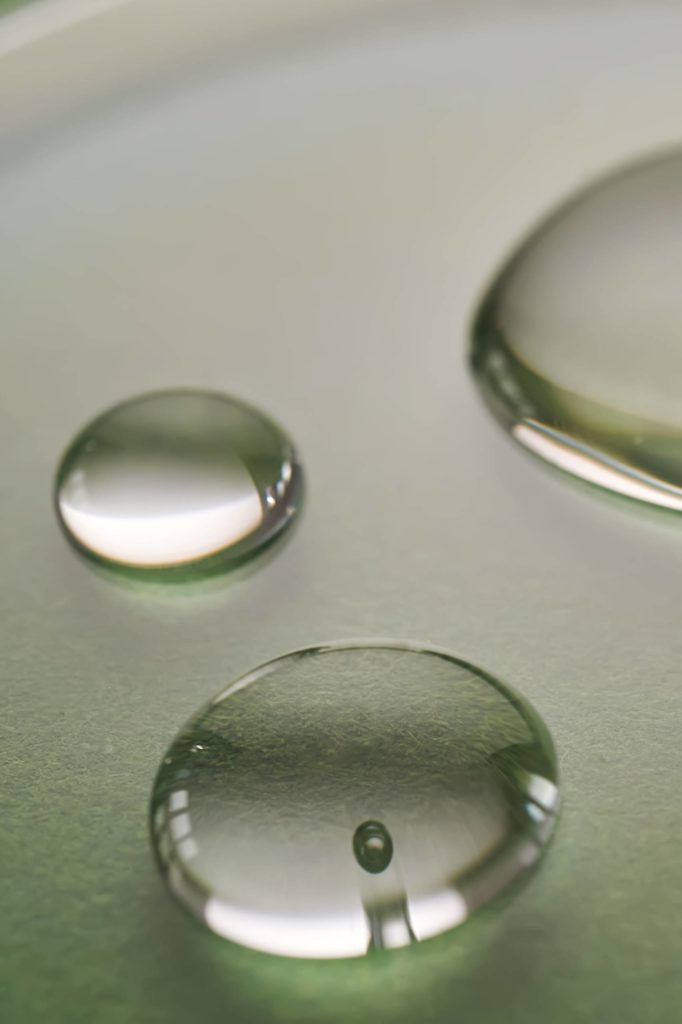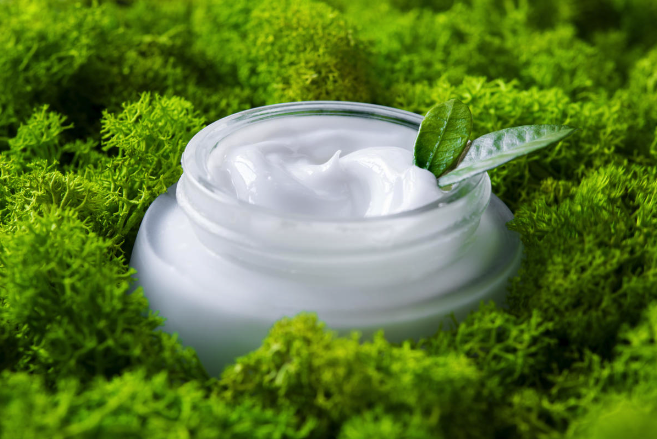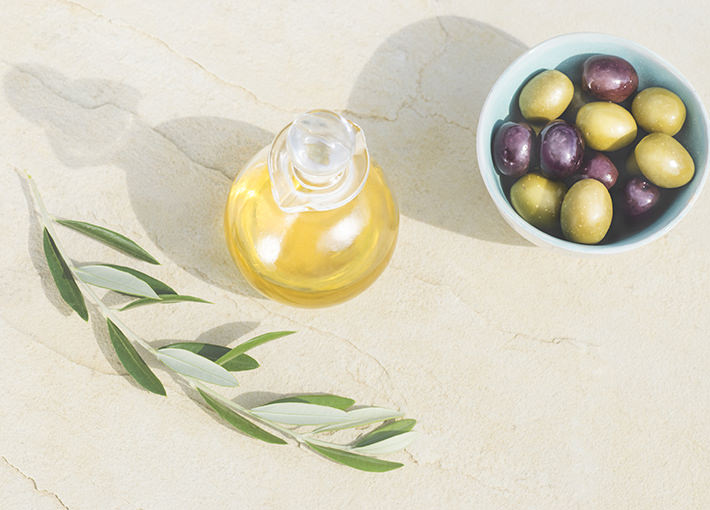Squalane C30H62 is a molecule that mimics our epidermis’ ability to repair and moisturise itself through the activity of sebum. It is an organic emollient and protective agent, appreciated on the cosmetic market for its great properties and its recognised benefits for the skin. Squalane has been at the heart of Sophim’s expertise since 1996, and we offer high quality squalane-based ingredients for your formulas.
What is squalane?

What is the difference between squalane and squalene?
Squalane is often confused with squalene. To better understand what squalane is, it is important to define squalene correctly.
Squalane: a stable squalene derivative
Squalene is a low-viscosity oil that is present in the unsaponifiable fraction of the oil of certain plants, notably olive oil, and in the unsaponifiable fractions of soybean or sunflower oil.
Its chemical formula is C30H50.
The unsaponifiable fraction of oils generally represents 1%, and contains tocopherols (vitamin E), sterols and squalene.
One may wonder why squalene is not used directly in cosmetic formulations. As a natural compound, composed of an unsaturated carbon chain, squalene is subject to oxidation, and would be less stable if incorporated into a cosmetic formula. This is why formulators tend to look for Squalane, whose chemical formula is C30H62, a stable derivative of squalene.
Squalane: a definition
Sophim is the world leader in the extraction of squalene from olive oil and the production of natural squalane. We extract squalene from food industry co-products, and by hydrogenating it, we are able to produce its stable derivative: Squalane.
What is squalane oil?
Squalane is the molecule that mimics our skin’s ability to moisturise and repair itself. Because it is composed of a saturated carbon chain, which means there are no chemical double bonds, it is more stable and therefore more likely to be incorporated into cosmetic formulas.
Types of squalane

Today, several types of squalane are available on the market.
Natural squalane:
In cosmetic applications, natural-type squalane will always be the preferred choice, especially squalane of plant origin, as it responds to a strong trend towards the development of natural products.
Plant origin: SOPHIM is now the leading manufacturer of vegetable squalane. The main source is Olive, but we also offer squalane from other plant sources such as Soya or Sunflower. We are proud to offer high-quality squalane ingredients from a variety of origins:
-
- Phytosqualan : Phytosqualan is a top-quality vegetable squalane, extracted from the unsaponifiable fraction of olive oil. It has a wide range of cosmetic applications, and is COSMOS-approved, solvent-free and GMO-free.
The origin of squalane, derived from plants, can be determined very quickly using a Carbon 13 test. SOPHIM systematically carries out Carbon 13 tests (CNRS Delta C12-13 test) on all its batches of vegetable squalane.
Marine origin: Historically, squalene was extracted from shark liver oil and used as a dietary supplement in Japan. Today, marine squalane is mainly used in the pharmaceutical sector, notably in the composition of vaccines. In other applications, it has been replaced by vegetable squalane.
Synthetic squalane:
- Petrochemical: derived from terpene compound synthesis technology
- Biotechnological: derived from the fermentation of sugar molecules by genetically modified micro-organisms, followed by the production of a farnesene molecule and chemical synthesis and dimerization to obtain squalane.
You would like to test our Squalane ?
Benefits

Benefits of squalane oil for the skin
Squalane is a widely known ingredient in the cosmetics market, and is included in many products from top beauty brands.
Squalane is versatile and is added to various finished products, for different benefits :
- In serums along with retinol, vitamin E or vitamin C, hyaluronic acid or niacinamides
- In emulsions to help to add comfort
- As a moisturizer thanks to its hydrating properties,
- In acne oriented products with other actives
- In skin-barrier supporting skincare
- In skincare claiming to limit signs of aging such as wrinkles
Possibilities are endless!
Squalane, skin affinity and emollient properties
Because it mimics our skin’s ability to moisturise and protect itself, squalane oil is highly compatible with the skin and hair. Its excellent affinity and emollient properties make it a very popular active ingredient in the cosmetic market.
It is ideal for products such as cream and milk formulas for different skin types, massage and hair oils, and hair serums.
Benefits of natural squalane for the skin
- Natural squalane is an ally in your cosmetic formulations, and it also has multiple benefits for the skin, including being an excellent moisturiser.
- Squalane helps restore the lipid barrier and protects the skin and hair from dehydration.
- It also has great moisturising properties and can be recommended in skincare products for different skin types, such as dry skin with a formula claiming a moisturising benefit, or with a facial for oily skin, as it is non-comedogenic.
- Squalane is a great ally in anti-ageing skin care thanks to its highly moisturising properties and its protective action against external aggressions.
- It can easily be incorporated into a skin care routine as a key ingredient in eye care, facial care or serum formulas.
Squalane, a sensorial asset
In the beauty sector, squalane is a sensorial asset.
Despite the fact that squalane is a lipid and therefore an oil, its non-greasy feel and sensation on the skin offer a sensory experience to the consumer. It is the best ingredient to enhance the sensoriality of your product.
Thanks to its spreading properties, squalane adds comfort and ease of use to the final product, both in skincare and make-up.
In conclusion, thanks to its sensorial texture and its compatibility with the skin, squalane is a unique natural emollient base for beauty and personal care.
In addition, natural olive squalane oil (such as Phytosqualan) is an ingredient that brings many benefits to your formulas:
- It is a molecule obtained from a natural source, it can allow you to claim naturalness in your formulas from these ingredients and thus meet the growing consumer demand for cleaner and more natural products.
- Security of supply is assured: as olive is a renewable raw material, olive squalane ensures a long-term supply strategy. Olive oil is the main oil used around the Mediterranean basin, and its production increases every year.
- The olive tree is a sustainable resource, as it has been rooted in the Mediterranean region for centuries, and does not require deforestation or monoculture to grow.
- Our olive squalane is COSMOS approved: the Ecocert certification was renewed this year. It guarantees the quality of our ingredients and compliance with cosmetic standards.
- As it is a squalene derivative, squalane has a great affinity with the skin, it is biocompatible.
- Its behaviour in beauty products: very soft textures, good moisturising, high penetration rate, and more; beyond its cosmetic benefits, the squalane of natural olive oil is a sensorial asset.
Phytosqualan use in cosmetics

Cosmetics manufacturing and squalane : how to formulate it ?
Phytosqualan is a transparent, odorless, stabilized oil (extracted from olives) perfectly suited to beauty products thanks to its perfect safety and affinity with the skin.
Phytosqualan is particularly recommended for facial care applications, including
- repair creams for dry skin,
- oily serums enriched with vitamins or actives such as retinol, for the face,
- eye contour,
- anti-aging, limiting signs of aging or wrinkles,
- mature skin formulas. Phytosqualan is of real interest for its moisturizing and repairing properties, and as an active ingredient carrier, enabling you to develop silky cream formulas with a non-greasy feel.
Squalane is also used in hair care formulations.
It forms a protective film on the hair’s surface, helping to maintain its hydration. It helps to smooth and coat the hair.
Its dry feel makes it highly suitable for emulsions with a dry, silky feel.
It is therefore particularly used in serum formulations for repair, protection, dry ends, dry, dehydrated hair, curly hair, color-treated hair, straightened hair, etc.
Finally, Phytosqualan is recommended in make-up formulations, notably lipsticks, mascara and foundation, for its high spreading properties, its silky dry feel; it will also support pigment dispersion.
Sophim also offers an alternative to certain silicones in its range of emollients. For more information about our products, please contact us.
Skincare routine and squalane: how to use it ?
Incorporating squalane oil into one’s skincare routine is straightforward and highly beneficial.
SOPHIM answers the most frequent questions from consumers:
- Day or Night?
As a versatile and lightweight emollient, squalane can be used both morning and night. - Which step of the routine? How much to use?
After cleansing and toning, apply a few drops of squalane oil to your face, gently massaging it into the skin until fully absorbed. - Is it suitable for all skin types?
Its non-comedogenic properties make it suitable for all skin types, including oily and acne-prone skin. - Mix and Match:
For enhanced hydration, you can mix squalane with your favorite moisturizer or use it as a standalone treatment. - Is squalane suited for skincare only?
Additionally, squalane can be applied to hair and cuticles to nourish and protect. - Which benefits can be expected from squalane?
Regular use of squalane helps to improve skin elasticity, reduce the appearance of fine lines, and restore the skin’s natural glow.
Sophim and Squalane
Natural squalane is at the heart of Sophim’s expertise. As early as 1996, we developed a process for extracting squalane from mainly plant sources, and more specifically from olive oil, which has the highest concentration of squalene compared to other plants. Today we are the leading supplier of vegetable squalane.
Through innovation and continuous process improvement, we are proud to offer high quality, Cosmos approved or certified squalane ingredients.
Phytosqualan – Olive squalane
Phytosqualan is a high-quality vegetable squalane, produced from unsaponifiable fraction of olive oil fatty acids. Its applications in cosmetics are numerous: face creams, dry oils for body care, makeup, sun care and more. It is solvent-free, GMO free, and Cosmos approved.
Insapolive – Olive squalene
Insapolive is a concentration of unsaponifiable olive oil, including 70% squalene. It has a powerful action on the hydration of the epidermis, and its applications in cosmetic products are numerous. It is Cosmos approved.
Sophim also offers an alternative to silicones in its range of emollients. For any further information about our products, please contact us.






